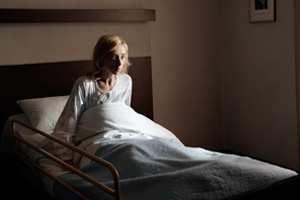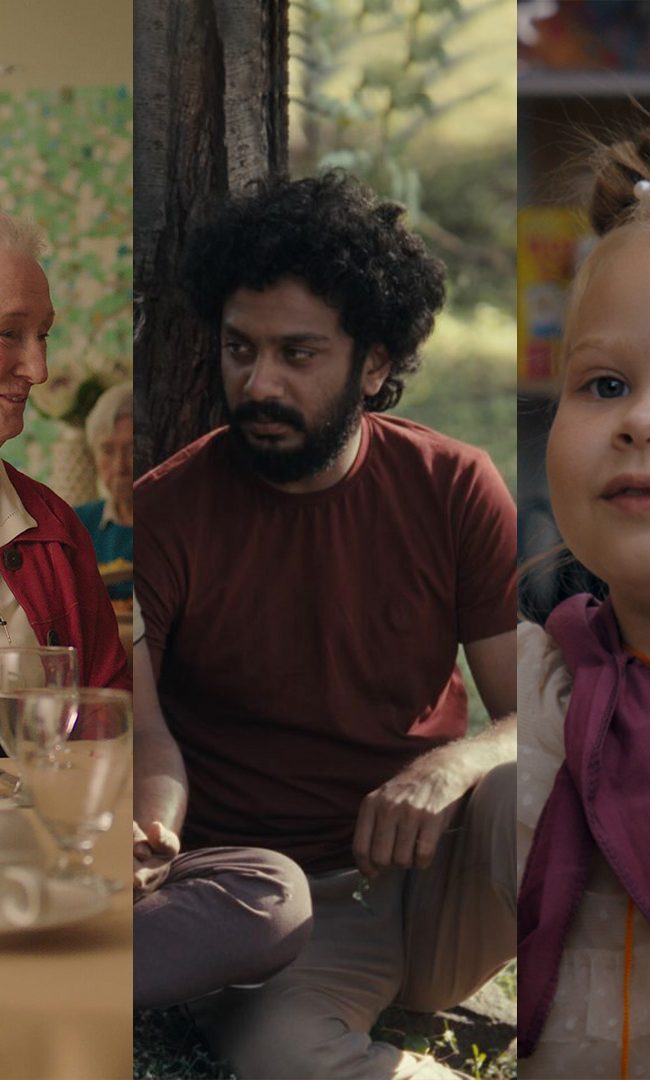(Lourdes is now available on DVD or Blu-ray through Palisades Tartan. It opened theatrically in March, 2011, at the Film Forum. Go here to watch a trailer and find out about upcoming screenings.)
Is Jessica Hausner’s Lourdes pro-religion? Anti-religion? Pro-miracle? Anti-miracle? In deftly avoiding any hints as to where her own allegiances lie, Hausner has crafted a film that leaves just about everything up to the viewer. Typically, this ambiguous approach to storytelling is more infuriating (Michael Haneke’s The White Ribbon) than stimulating (Bruno Dumont’s Hadewijch), but even with its subtle injection of black humor, Lourdes doesn’t feel like the work of a smirking manipulator. If anything, Hausner is paying respect to her material by refusing to play God and provide concrete answers.
The setting is Lourdes, a small town in the southwest of France that has become a major pilgrimage site for Roman Catholics based on its reputation for miraculous healings. Christine (Sylvie Testud), a wheelchair-bound victim of multiple sclerosis who cannot move from the neck down, has arrived with a group of similarly afflicted souls. They are watched over by pretty nurses, led by Elina Lowensohn’s Cecile, who dress like nuns and who are good at their jobs, yet they are clearly unsettled (i.e., embarrassed/humbled) by the sickness that surrounds them.
 While Hausner doesn’t take a stance on the issue of miracles, she nonetheless expresses some concerns with regards to this particular form of religious devotion. She effectively establishes a Roman Catholic mood—the repressed sterility that is simultaneously reverent and eerie—by employing long static shots, as if to acknowledge the hovering presence of a God that may or may not, in fact, be watching. In physical terms, frozen statues loom in both the foreground and background, to both reassure visitors of the potential of a miracle and reinforce concerns that this is all one big sham. Rhythmically, the film unfurls at a quiet pace, which doesn’t just echo the slow, repressed aura of Roman Catholicism (I was an altar boy, don’t challenge me on this one), it also reflects Christine’s paralytic condition.
While Hausner doesn’t take a stance on the issue of miracles, she nonetheless expresses some concerns with regards to this particular form of religious devotion. She effectively establishes a Roman Catholic mood—the repressed sterility that is simultaneously reverent and eerie—by employing long static shots, as if to acknowledge the hovering presence of a God that may or may not, in fact, be watching. In physical terms, frozen statues loom in both the foreground and background, to both reassure visitors of the potential of a miracle and reinforce concerns that this is all one big sham. Rhythmically, the film unfurls at a quiet pace, which doesn’t just echo the slow, repressed aura of Roman Catholicism (I was an altar boy, don’t challenge me on this one), it also reflects Christine’s paralytic condition.
Late in the film, when an apparent miracle has actually transpired, the assembled pilgrims begin to reveal their true colors; though, since we’re talking about Catholicism here, those colors are expressed in tiny looks and passive-aggressive gestures. One of the aging nurses approaches the head priest and asks him why the miracle impacted one individual instead of another. His response is a vague, “God is free,” to which the nurse confusedly, but observantly, nods and drifts sheepishly away. It was at this moment that I had a revelation of my own: Lourdes is to Catholicism as A Serious Man is to Judaism!
For those who are distracted by the (perhaps?) medically unsubstantiated miracle that occurs, this is a good time to point out that Lourdes is best viewed through the prism of metaphor. For Hausner to make a definitive statement about miracles would have been implausible, arrogant, and silly. Lourdes is all the more inviting for being so slyly humorous, so timidly critical, so utterly open-ended. Not to mention the mere presence of Testud, who is her own unequivocal miracle.
— Michael Tully












Pingback: HOME VIDEO PICKS – Hammer to Nail